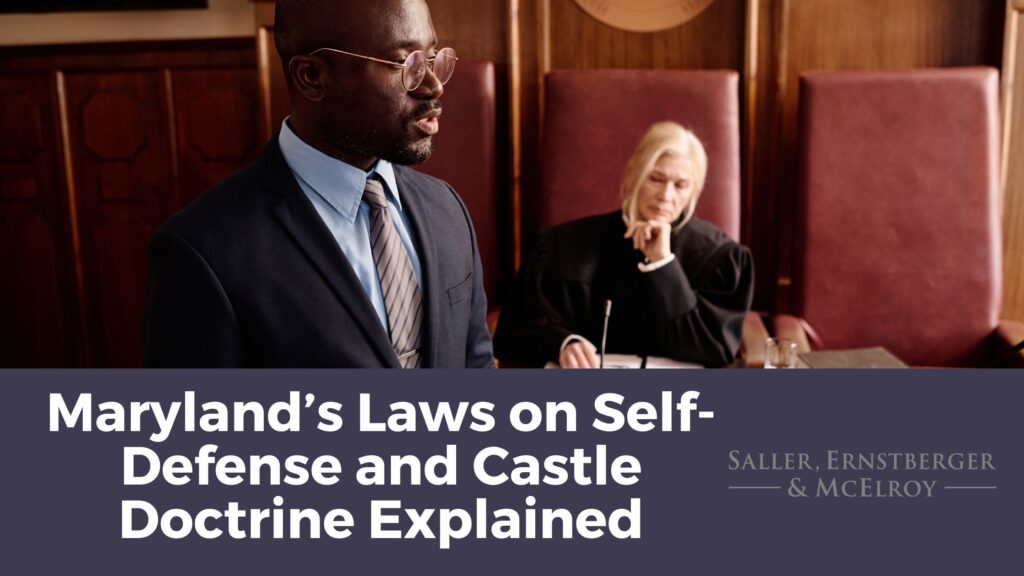
Maryland’s self-defense laws may not be what you assume them to be. Maryland has a duty to retreat law and is not a stand-your-ground state. This means that citizens are required to look for a safe exit plan before resorting to self-defense when under threat in a public space.
However, Maryland does recognize the Castle Doctrine law, a right to defend one’s home. This allows homeowners to use self-defense, and sometimes deadly force, within their home. The use of force must match the level of the threat, which can get tricky.
So, which is it? Must you retreat if under threat? Or are you legally allowed to stay and use self-defense to protect yourself?
Find out more about the right of self-defense in Maryland and how you can avoid a criminal charge if acting under self-defense, either in your home or out in public.
Disclaimer: articles on sallerlaw.com are not intended as legal advice and should not be taken as such, please consult an attorney for advice about your individual situation.
What is a Duty to Retreat
Yes, Maryland has a Duty to Retreat Law
A state with a duty to retreat law requires its citizens to de-escalate or remove themselves from a threat before acting in self-defense or using deadly force.
Why a Duty to Retreat Law
This law stems from the priority of less violence, believing that a society that backs away from confrontation will be less violent and cause less harm. In practice, however, a duty to retreat comes into conflict with the natural reaction of self-defense when under a threat.
Maryland’s Duty to Retreat Law
In public, when under threat, you are required to remove yourself from a threatening situation or de-escalate the conflict. If you have a conceal-carry permit (known as a wear-and-carry permit), withdrawing your weapon when under threat in public may make you the culprit of a crime, not the victim.
Maryland’s duty to retreat law can be complicated for its citizens. When under threat, we do not always look to de-escalate or rationally plan a route of escape. If you are concerned about acting in self-defense and are now facing criminal charges, our lawyers at Saller, Ernstberger, & McElroy can help – call today.
What is a Castle Doctrine State
Yes, Maryland Has a Castle Doctrine Law
Under a Castle Doctrine law, you have the right to defend yourself and your family in your home if under threat. However, you must react to the threat with an appropriate level of force.
Why a Castle Doctrine Law
The title Castle Doctrine comes from the belief that your home is your castle, your sanctuary, and is yours to defend.
Maryland’s Castle Doctrine Law Explained
If under threat in your own home in Maryland, you have the right to self-defense, but must not use excessive force unless warranted. For example, an unarmed person who is breaking into your house and shows no appearance of threatening your life may not be the victim of deadly force.
Castle Doctrine + A Duty to Retreat
A duty to retreat law is invoked in public spaces, ie, parking lots, shopping malls, and similar locations. A Castle Doctrine allows you to defend yourself in your home. It is an important distinction to avoid being charged with a violent crime when acting in self-defense.
In both scenarios, if you are in your home or cannot find a safe exit plan when under threat in public, you must react with an appropriate amount of force. For example, if you have a firearm in your home for self-defense, you must only use deadly force if you believe, and can later prove, you were the intended victim of a life-threatening action. Maryland law will examine the self-defense actions and the actions of the threat to determine fault and charges, fines, or jail time.

What is a Stand Your Ground State
No, Maryland Does NOT Have Stand Your Ground Laws
You may have heard the term stand your ground state. Maryland does NOT have stand your ground laws.
In a stand your ground state, you have the right to defend yourself anywhere you are legally allowed to be. If under threat in a public space, your home, your vehicle, or anywhere you have the right to be, you may use reasonable self-defense to protect yourself.
This does not apply in Maryland and should not be cited when acting in self-defense and facing legal charges or penalties for doing so.
Right of Self-Defense in Maryland
- You have a duty to retreat when under threat in public if able to do so safely
- You have the right to defend yourself in your home if under threat
- You must not use deadly force unless you are the victim of a life-threatening action
- Your level of self-defense must be an appropriate reaction to the level of the threat you are experiencing
- Maryland does not have stand your ground laws

What To Do If You Have Acted in Self-Defense in Maryland
Acting in self-defense in Maryland can sometimes lead to charges for acting violently or causing harm to another person. In order to legally protect yourself after defending against a threat, you want to act fast.
- Contact a lawyer at Saller, Ernstberger, & McElroy for representation
- Record everything about the scene and the incident
- Document injuries, use of force, occurrences of the threat, and more
- Ask to speak to your lawyer if interrogated by the police
- Do not share details of the incident with anyone until the case is closed
Contact an Experienced Self-Defense Lawyer in Baltimore
An experienced defense attorney in Baltimore can help defend your case if you are facing charges for acting in self-defense in Maryland. Clients are shaken all the time by reacting to a threat and then being charged with a crime. We are here to help.
Saller, Ernstberger, & McElroy are located in Baltimore, Maryland and can help you understand your rights to self-defense in Maryland. Do not assume your rights will be protected if you have caused injury when acting in self-defense – get a lawyer and be protected.
Frequently Asked Questions
Does Maryland have a duty to retreat law?
Yes. In Maryland, you must attempt to retreat or de-escalate a threat in public before using self-defense. Using force without attempting to withdraw may result in charges.
What does Maryland’s Castle Doctrine law allow?
Maryland’s Castle Doctrine law allows you to defend yourself in your own home if under threat. However, the force used must match the level of the threat and cannot be excessive.
Is Maryland a stand-your-ground state?
No. Maryland does not have stand-your-ground laws. You cannot legally defend yourself anywhere you are without first considering a safe retreat in public spaces.
When is deadly force justified in Maryland self-defense cases?
Deadly force is only justified if you reasonably believe you are the victim of a life-threatening action. Using deadly force in non-life-threatening situations can lead to charges.
What should I do if I acted in self-defense in Maryland?
Contact a lawyer immediately, document the incident and any injuries, record details of the threat, and avoid discussing the case with others. Always request to speak with your attorney before answering police questions.
-
In every case, we work directly with clients from the beginning to the end of a case. We hear about many lawyers who take the money and their client interaction doesn’t take priority. We know that an ideal outcome must come from collaboration with our clients. This approach ensures that everybody gets a fair deal – that our clients are never run over by what can be an unfair system.
If you have been charged or are being investigated, it is absolutely crucial to begin defending as soon as possible. We encourage you to get in touch.
Get Your Free Consult


